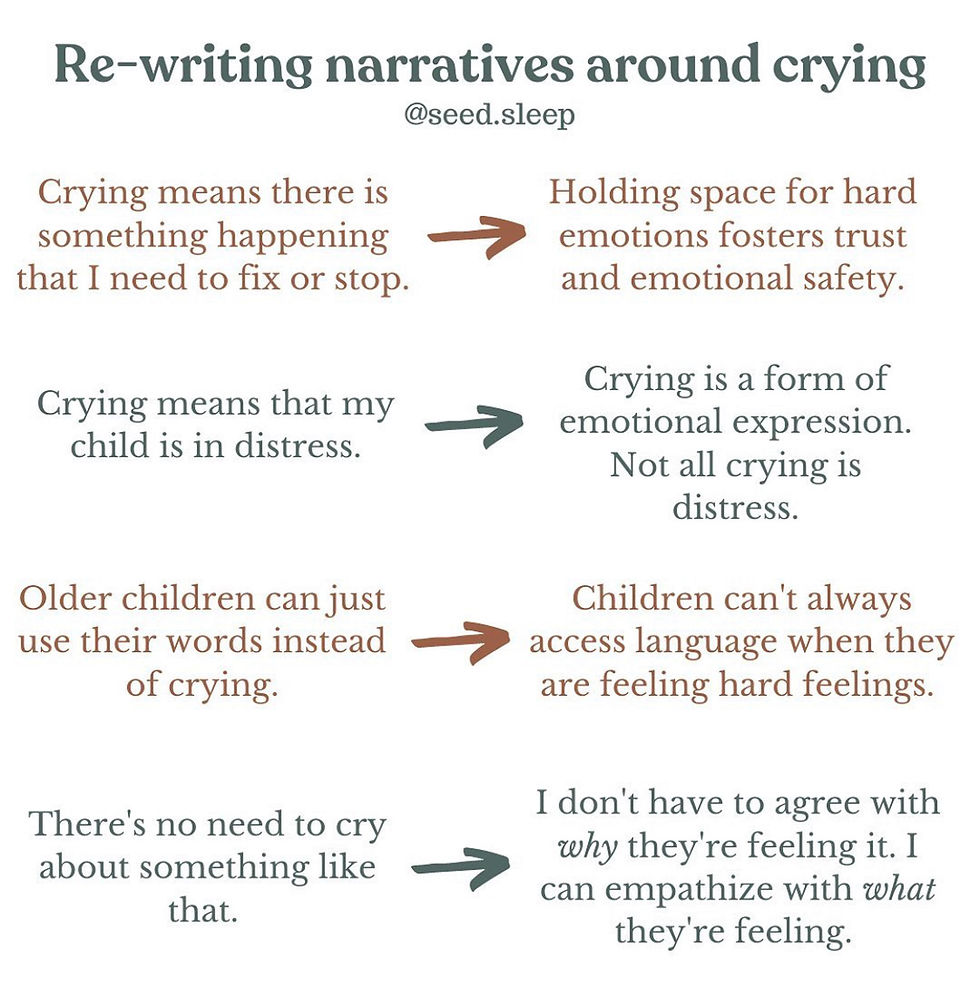From Surviving to Thriving: A Compassionate Guide to Back-to-School Challenges
- Amy Chiu
- Sep 10, 2023
- 8 min read

Picture this: It's your first day at a new job. You're excited and also anxious about how the day will go. You enter your new office and scan the room. Everyone is a new face, and you're not sure who to ask for help in finding your desk, where to store your lunch, and how to settle in and get started. It's a bit overwhelming. Being an adult, you remind yourself that you got this, you take a deep breath and begin introducing yourself to your officemates...
Now picture your young child entering a new classroom for the first time. Your child is excited and anxious as well. You reassure your child that everything will be okay, that teachers are there to help, and that you know they will have fun and can't wait to hear all about it at pickup time. You've practiced taking deep breaths together to ease the jitters, and then you leave after saying a warm goodbye.
At this point, one of three things are likely to happen: Your child says bye with nary a glance your way and begins an activity with peers. Your child says bye with sad eyes, but sucks it up and puts on a brave face. Or, your child bursts into tears and begs you not to leave.
In truth, you may experience all three things throughout the first weeks of school. This is typical of this back-to-school transition for young children. Keeping in mind the analogy of starting a new job, we can be more compassionate to our children as we help them ease into a new routine. Here are some things we can do as parents to support:
Tearful separations: This is very, very tough for most parents. We are attuned to respond to our children's distress, and no parent feels good about walking away from their crying child, especially one who is clinging to your whole body like a vise. As soon as you can, create a SEPARATION ROUTINE that you will do with your child every school day.
First, we must learn to ACCEPT our child's feelings wholesale (even when they don't make sense to us) and VALIDATE that it is hard to say goodbye. Then, COMMUNICATE CLEARLY when we will be reunited ("I'll pick you up after afternoon snack" or "I'll come get you when I'm done with work and then we will go home and make dinner.") Lastly, create a PHYSICAL RITUAL that signals it's time for you to leave. Ideally, you create this ritual with your child so they feel ownership. Maybe it's a hug and two kisses, or maybe it's a fist bump. I've seen some creative rituals over the years; one parent always drew a heart on her child's hand, and one dad played the hype man and walked into school playing a song on his phone to dance into the day.
Always follow through on your plan and communicate in advance when plans change, to the extent possible. These above steps are creating a ROUTINE for your child to experience, and over time and with CONSISTENCY, they will know what to expect when it's time for you to go. All of this will amount to less stress and anxiety for your child.


Tearful reunions: Finally you are done with work and you are eager to pick up your child to see how their day went. You arrive and your child runs into your arms with big tears. You scoop up your child and connect with the teacher who mentions a few things your child did that day which all sounded fun. So why is your child melting down now?
This part can be very stressful and challenging for parents. The good news is, your child feels SAFE to fall apart with you because your child is sure of your love. Again, following the analogy of starting a new job, you can maybe see why end-of-the-day reunions can become emotional outlets. All day long, your child has had to keep it together and do lots of things: make choices, participate in discussions, practice new skills, interact with peers, have lunch in a raucous environment, switch gears without much notice, and a litany of other things that add to their mental and physical load. At the end of the day, they get to release all of their pent-up emotions to you, their safe harbor.
We know that it's healthy to express our feelings and not bottle them up, but it can be hard to understand why it takes so long for our child to get used to school. Maybe it has already been a few weeks and your child is still falling apart after school which makes evenings at home difficult and unpleasant. We may get exasperated at these meltdowns, which in turn makes everyone irritable and impatient. Everyone is tired by this time of day, so what is a parent to do?
Focus on connection: Emotions want to be recognized and accepted, not changed or reasoned with. We can meet our child's emotions with understanding and acceptance which helps the person to move through them with less struggle. The secret ingredients are EMPATHY and COMPASSION. Empathy is when we feel we understand another's feelings and struggles, but sometimes it is hard to truly understand what our young child is going through. Compassion says that we want to help even when we don't understand exactly what a person is going through. Be the soft landing for your child when the world feels prickly. Compassion and empathy will foster CONNECTION.




There are many ways to connect after a long school day, and you can create a responsive evening routine to help your child to relax and recharge. These additions don't have to dominate your already busy nights. They are meant to be simple tweaks with many benefits.
Less talking, more listening: Going back to the analogy of starting a new job, remember that when you finally pick up your child they have had a full school day with many demands and the ride home may be the first time they have to just...be. They have been quizzed on things all day long and they may just want to look out the window or listen to their favorite music. When we ask "What did you do today?" it can actually increase stress and anxiety for our child. This question is also too broad so you may get a response like "nothing" or "I don't know."
Some children are chatty at pickup and that is okay, too. They may be ready to tell you about their day right away. The point is to follow your child's lead and respond in a way that meets your child's present needs.

Sensory activities: No matter one's age, sensory experiences provide comfort and calm. Nature and water are simple ways to meet sensory needs. Maybe there is time for your child to play outside after school. Or maybe your child can go right into a bath. Or maybe you can provide play dough to play with while you are making dinner. Hands-on sensory experiences offer an outlet for overworked bodies and minds which can soothe strong feelings.
Add movement: Oftentimes schools do not offer enough movement breaks that young children need to be well and feel well. Consider adding activities that allow your child to be active, like a walk around the neighborhood, doing an obstacle course, or an impromptu dance party.
Unschedule: Modern families have a lot to do, sometimes to a person's detriment. If your child is still falling apart after many weeks for no apparent reason, revisit your schedule and see if removing something can help, from soccer practice to weekend plans. We all need time to truly decompress.
Be a detective, not a judge: The point is to STAY CURIOUS. When we are curious rather than judgmental, we can eliminate the pain of taking our child's behaviors personally. Their behavior communicates things they are not yet able to articulate and we can be a witness to the behaviors without taking responsibility for them. Remember this mantra: My child is doing the best they can with the tools they have.
As an educator, when I notice that a child isn't being their usual self, I first run down a list of needs to see which ones are not being met. I often refer to Maslow's hierarchy of needs:

Starting at the bottom of the triangle, we can see the categories of basic, psychological, and self-fulfillment needs. When basic needs are not met, we cannot move on to meet self-fulfillment needs.
Questions I ask myself when a child is out of sorts: Are they hungry or thirsty? Tired? Need to go to the bathroom? Not feeling well? Dressed too warmly? Etc.
Then I move on to questions about psychological needs: Are they feeling connected to their teacher(s)? Friends? Do they feel listened to?
When a child first begins school, we should be focused on meeting their basic needs so they can feel safe and secure. In time, they will begin to have their psychological needs met, for example, when they grow relationships with their teachers and peers. When something is amiss, refer to this hierarchy of needs as a starting point.
Other strategies to support your child's transition from home to school and back again:
Partner with teachers: Teachers will have a lot of insight into your child's school life. From the beginning, cultivate a respectful and supportive relationship with your child's teacher(s). When you share your worries, relay them in a non-judgmental way. Be sure to keep to professional boundaries and limit your communications to school hours (remember that teachers have their own lives and demands outside of school). Request time for a dedicated chat if you are needing more than a few minutes of their time. Show your child that you and their teacher are a team.
Self-reflection and self-understanding: No one comes out unscathed as a parent. We are sure to be triggered and lose our cool sometimes. We will make mistakes. We are not perfect, we are human. When we take the time to reflect on our experiences we can begin to notice our own triggers and patterns of behavior. That is the first step to breaking patterns that don't serve us or our family.


Give grace: This is a gift to our child and to ourself. We ALL make mistakes, especially when our emotions are overwhelming. Neuroscience tells us that our brain's prefrontal cortex (the area that controls our emotions) doesn't fully mature until we are in our mid-twenties, so we need to adjust our expectations of our child. If we believe that we learn from mistakes, we have to give grace when mistakes happen.



Live in the pause: Let's move from being reactive to being responsive. Let's stop knee-jerk reactions in favor of measured responses. This isn't easy to do, but the more we can practice PAUSING BEFORE RESPONDING the less we will have regrets. None of us are motivated to do better with harsh words or punishment.

Give it time: This is the remedy to virtually all parenting challenges. Some children take a few weeks to settle into school, some will need a few months. Repeat after me: It takes as long as it takes. Try not to compare how your child is doing to how other people's children are doing because we can't possibly have the whole picture. Everyone deserves to be seen and helped as an individual.



Summary:
1) ACKNOWLEDGE and ACCEPT all feelings.
2) Practice SEPARATION ROUTINE and keep it CONSISTENT.
3) Focus on CONNECTION.
4) MEET our child's present NEEDS.
5) Be CURIOUS, not judgmental.
Thanks for reading! You got this!!


Comments